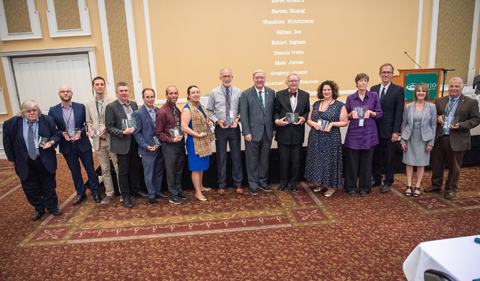College of Arts & Sciences faculty are tackling the challenges of the 21st century by building interdisciplinary and team-taught courses around a new set of curricular themes.
From Fire to iPhones, human beings have always engaged in developing new technologies to improve their work, quality of life and relationships with others.
“Our culture speaks of ‘technology’ as though it describes the most cutting-edge digital inventions. And it does. But technology itself is nothing new. Humans have been developing new technologies throughout our history,” says Dr. Rosemary Rossiter, Professor and Chair of Economics and coordinator of the Fire to iPhone curricular theme.
“This theme, through a variety of disciplines, traces progressions of key technologies across human history and critically investigates how those technologies have shaped society in the past and how new technologies might shape our future,” she says. From written language to the book to the telephone to GIS, students in the Technological Human theme will explore questions such as:
- How and why do we create technologies?
- Why and in what contexts do we choose certain technologies?
- How have technologies (e.g. Twitter, texting) changed the ways we read, write, and communicate?
- What ethical dilemmas arise with the emergence of WikiLeaks and other hacker whistle-blowing?
- How is technology blurring the boundaries between human and machine being? Is our immersion in technology transforming us into cyborgs?
- How does our culture construct technology, and how does that shape what we do with it?
- How is computer technology, such as drones, transforming warfare? For good or ill?
- What futures imagined in science fiction have become reality? How might speculative fiction help us to make decisions about using technology?
- How do GPS and other invasive technologies generate new ethical questions for society?
- How do technologies shape our workplaces, living spaces, and economies?
- How does a technology develop from a far-fetched idea to that glowing device you’re holding in your hand? What technologies might be next?
- How do race and class influence access to digital technology?
- How are technologies shaping your identity?
- Who “owns” a text, song, or game? Does ownership change when it’s remixed, say, in fan fiction? Or when the “property” is open source? In what ways does intellectual property law constrain creativity?
- Has technology doomed us? Can it save us?
Steering Committee Members
- Sherrie Gradin, English
- Lynne Lancaster, Classics
- Talinn Phillips, English
- Rosemary Rossiter, Economics
- Gaurav Sinha, Geography
- Eric Stinaff, Physics
Other Committee Members
- Jeff Giesey, Engineering
- Joseph Lee, Linguistics
- Ghirmai Negash, English
- Luke Pattaway, Management
- David Rosenthal, Plant Biology
- David Sharpe, English

















Comments